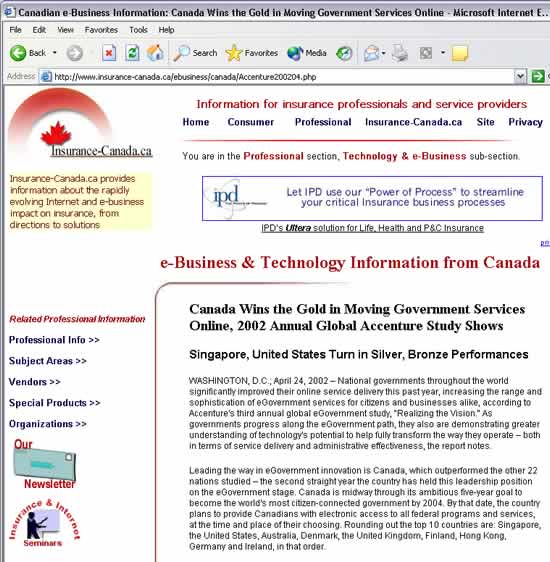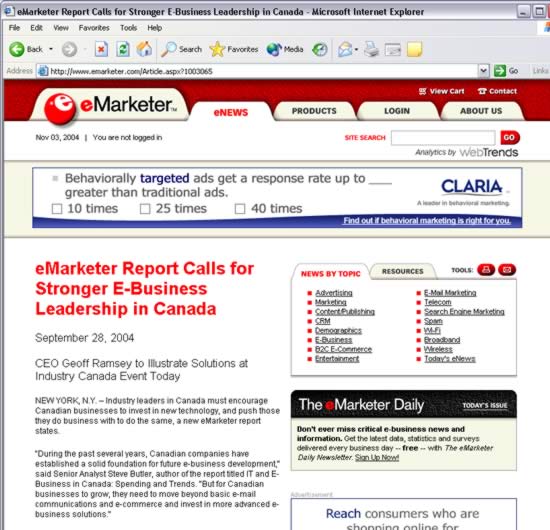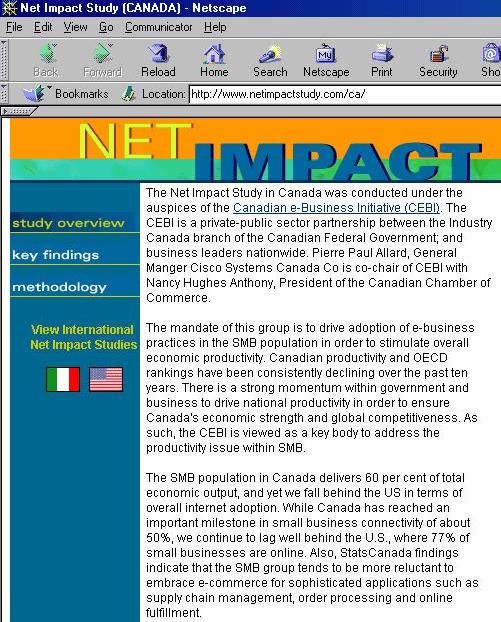e-business capability and interests

| Canada's
e-business capability and interests |
 |
 |
Nini Mounivong
of BCS 555 in November 2004 provided several helpful updates to this section
on Canada and e-Business
Thanks Nini, Witiger |
.
| . | In May 2003 the Globe
and Mail did a special e-Business Report (which they have done every
once in a while over the past few years). This report referred to the CeBi
- Canadian E-Business Initiative http://cebi.ca/
and a study done by the CeBi which was, in effect "Canada's On-line Report
card". This section will look at what the Globe said + we will look at
the CeBi site itself and material from the original report.
WTGR |
| Learning Objectives | After studying this unit
students will be able to:
|
|
|
|
||
| The Globe article
explained
http://www.globetechnology.com/servlet/story/RTGAM.20030501.gtjackmay1/BNPrint/Technology/?mainhub=GT "Canada's strong economic performance is not well understood internationally, CeBI stated. Studies of U.S. business
show investor and general public perceptions of Canada's economy as primarily
resource-based and that "Canada's innovation image is weak." Image and
perception and not performance, CeBI concluded, are the major hindrances
to attracting additional investment and skills to the
A related CeBI report, called Net Impact Canada: The International Experience, compared Canada's e-business adoption of e-commerce among small to medium enterprises to three leading European countries and the United States. That study revealed that Canada compares very favourably, and even leads in key areas such as e-government. The studies "clearly illustrate that governments and business in Canada must work to address the weaknesses which are holding us back from creating a dynamic, robust and productive e-business climate," CeBI co-chairman Pierre Paul Allard said." |
|||
 |
Nini from
BCS 555 found a site that shows Canadian government websites ranking high
according to an international comparison done by the giant consulting firm
Accenture.
 |
|||
Top
Ten Government services online
The Insurance Canada article explained http://www.insurance-canada.ca/ebusiness/canada/Accenture200204.php "Leading the way in eGovernment innovation is Canada , which outperformed the other 22 nations studied – the second straight year the country has held this leadership position on the eGovernment stage. Canada is midway through its ambitious five-year goal to become the world's most citizen-connected government by 2004. By that date, the country plans to provide Canadians with electronic access to all federal programs and services, at the time and place of their choosing...." "Citizens' expectations of government have been permanently altered in recent years by forces such as: aging populations, increased service expectations, security concerns, a talent crunch, competition by the private sector and fiscal pressure that forces governments to find ways to do more with less," said David Hunter, Group Chief Executive of Accenture's Government group. "End-to-end eGovernment transactions are emerging as one of the most promising tools for governments to use in achieving real transformation as they deliver public services in the 21st century." |
||||
| The
Insurance Canada website also had other related articles:
Canada Continues to be a Global Leader on Connectedness http://www.insurance-canada.ca/ebusiness/canada/CBoC200208.php OTTAWA , August 8, 2002 – More Canadians are browsing, interacting, learning, and buying over the Internet every year, according to the annual Connectedness Index from The Conference Board of Canada. Canada is a global leader in the use of information and communications technologies (ICTs) – second only to the U.S. Four sectors in particular benefit from Canada 's strength in connectedness – health, education and learning, business, and government. "Canada is clearly connected, for example, we ranked first in the index for on-line banking, government on-line services, and broadband penetration, " said Brian Guthrie, Director, Innovation and Knowledge Management at the Conference Board. "Each year Canadians are becoming more comfortable with computers, the Internet, and their applications, but we shouldn't be complacent. Other countries are making connectedness a priority and are progressing quickly..." The report points to three key opportunities for improvement – broadband services, content, and wireless. Focusing on these areas will offer Canada the most opportunity to strengthen its position as a leader in connectedness, and improve its overall socio-economic performance. Broadband – high-speed connections – allows for new applications involving video, sound, and large data files..." |
| The
Insurance Canada website also had other related articles:
Canada Gets with IT: eMarketer http://www.insurance-canada.ca/ebusiness/canada/eMarketer-Canada-IT-409.php September 29, 2004 Nini Mounivong of BCS 555
says that it is interesting to note that "eMarketer reports that 2004 will
see the first significant increase in technology spending by Canadian businesses
and government since 2001."
|
 |
 |
| The
eMarketer article reports
http://www.emarketer.com/Article.aspx?1003065 "...Canadian companies have been less aggressive in their use of technology to transform business processes than American firms, the report states. According to government data, labor productivity in the United States grew by 4.5% in 2003, while Canadian labor productivity grew by just 0.4% last year. "Large enterprises outside of Canada have influenced and, at times, mandated the adoption of certain new technologies as a condition for doing business. The result is that trading partners and competitors see the value in greater e-business connectivity..." |
|
|
|
 |
||
| The Net Impact Study Canada is in a PDF format and can be read online at www.netimpactstudy.com/ca/pdf/canada-en.pdf | |||
|
CeBi
CeBi |
|
||
Here is an example of how
the CeBi works, the e-Business Engagement team is lead by John Maduri,
President, TELUS Business Solutions. They have been studying the fact that
Canadian SMEs lag their U.S. counterparts in adoption and use of e-business."The
e-Business Engagement team will focus its efforts on raising the awareness
of SMEs and providing the necessary tools."
|
|||
|
|
CONTACTIMAIN PAGE I NEWS GALLERY IE-BIZ SHORTCUTS I INT'L BIZ SHORTCUTS IMKTG&BUSINESS I TEACHING SCHEDULE IMISTAKES ITEXTS USED IIMAGESIRANKI |
| . |